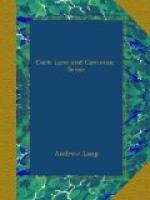On the question of the real existence of the reported phenomena hereafter chronicled, and on the question of the portee of the facts, if genuine, the writer has been unable to reach any conclusion, negative or affirmative. Even the testimony of his senses, if they ever bore witness to any of the speciosa miracula, would fail to convince him on the affirmative side. There seems to be no good reason why one observer should set so much store by his own impressions of sense, while he regards those of all other witnesses as fallible. On the other hand, the writer feels unable to set wholly aside the concurrent testimony of the most diverse people, in times, lands and conditions of opinion the most various. The reported phenomena fall into regular groups, like the symptoms of a disease. Is it a disease of observation? If so, the topic is one of undeniable psychological interest. To urge this truth, to produce such examples as his reading affords, is the purpose of the author.
The topic has an historical aspect. In what sorts of periods, in what conditions of general thought and belief, are the alleged abnormal phenomena most current? Every one will answer: In ages and lands of ignorance and superstitions; or, again: In periods of religious, or, so to say, of irreligious crisis. As Mr. Lecky insists, belief in all such matters, from fairies to the miracles of the Gospel, declines as rationalism or enlightenment advances. Yet it is not as Mr. Lecky says, before reason that they vanish, not before learned argument and examination, but just before a kind of sentiment, or instinct, or feeling, that events contradictory of normal experience seem ridiculous, and incredible.
Now, if we set aside, for the present, ecclesiastical miracles, and judicial witchcraft, and fix our attention on such minor and useless marvels as clairvoyance, ‘ghosts,’ unexplained noises, unexplained movements of objects, one doubts whether the general opinion as to the ratio of marvels and ignorance is correct. The truth is that we have often very scanty evidence. If we take Athens in her lustre, we are, undeniably, in an age of enlightenment, of the Aufklarung. No rationalistic, philosophical, cool-headed contemporary of Middleton, of Hume, of Voltaire, could speak more contemptuously about ghosts, and about the immortality of the soul, than some of the Athenian gentlemen who converse with Socrates in the Dialogues. Yet we find that Socrates and Plato, men as well educated, as familiar with the refined enlightenment of Athens as the others, take to some extent the side of the old wives with their fables, and believe in earth-bound spirits of the dead. Again, the clear-headed Socrates, one of the pioneers of logic, credits himself with ‘premonitions,’ apparently with clairvoyance, and assuredly with warnings which, in the then existing state of psychology, he could only regard as ‘spiritual’. Hence we must infer that belief, or disbelief, does not depend on education, enlightenment, pure reason, but on personal character and genius. The same proportionate distribution of these is likely to recur in any age.




